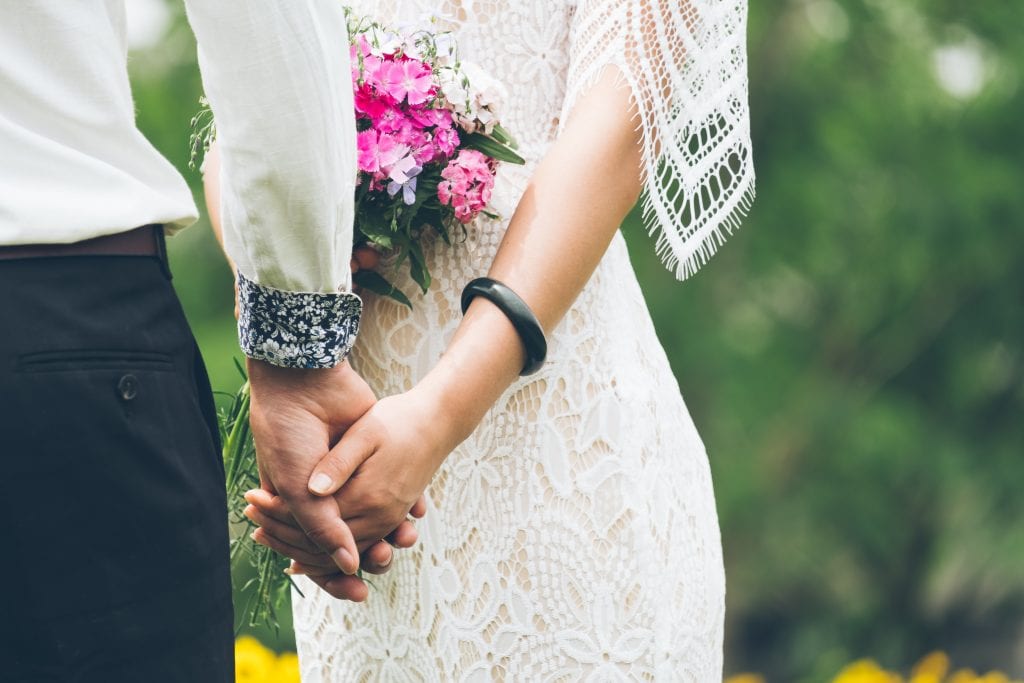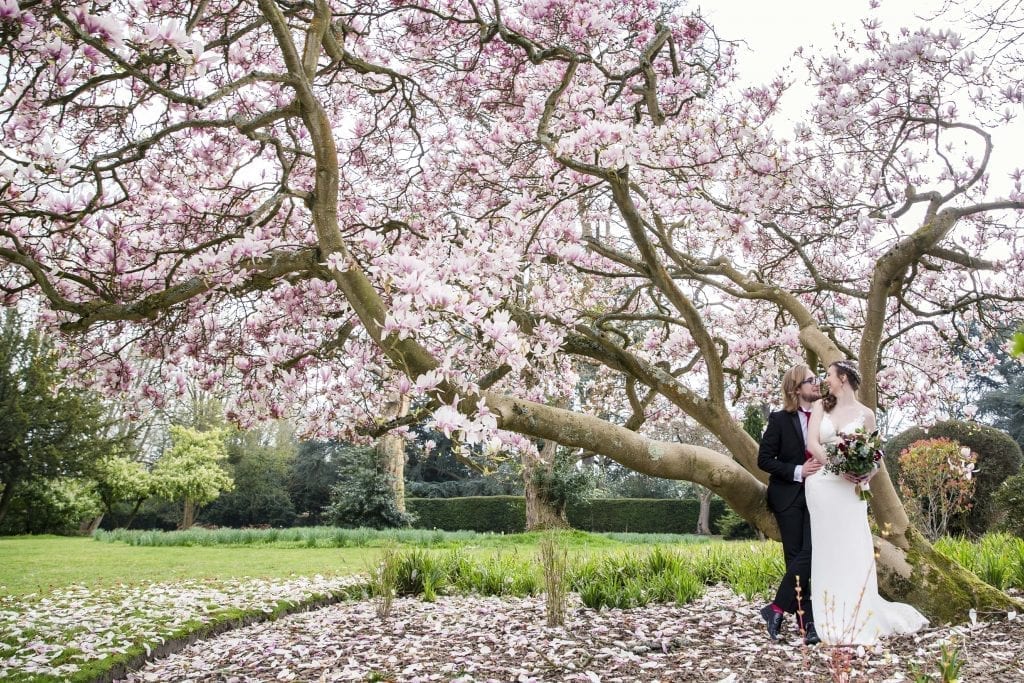The Ultimate Guide to Planning an Outdoor Wedding
Author: Hollie Bond
NB: To help you browse our best suggestions we have included some third party links. Some purchases made through these links may earn us a commission to help keep our blogs and offers current and up to date. Thanks for your support!
Fancy holding your big day in the great outdoors in the UK? Here’s everything you need to know to pull off the perfect al fresco affair.
Just imagine walking down an aisle strewn with flowers with a warm breeze in your hair and a brilliant blue summer sky overhead. Sounds idyllic, doesn’t it? But planning an outdoor wedding ceremony or reception can be a lot more time-consuming than a traditional indoors one, and of course, the UK weather isn’t always predictable or on the side of loved-up couples praying for a sunny wedding day.
However, outdoor weddings are becoming increasingly popular, partly because being surrounded by nature makes them so magical (plus the light for photographs is absolutely perfect) and partly because the coronavirus pandemic makes outdoor weddings a much more appealing and safe option for everyone involved.
While many countries like America and our very own Scotland have very relaxed rules about marrying under the stars and in all manner of fabulous outside spaces, England and Wales have much stricter regulations that need to be adhered to in order to ensure your wedding is legal.
But, if you can’t stop thinking about heavenly wedding photos capturing romantic natural light or saying “I do” by the sea, in a garden or in a forest glade, then don’t let the unpredictable weather or the thought or having to do more than the average amount of setting up put you off. Here’s our ultimate guide for how to organise the al fresco wedding of your dreams.
What are The Rules About Outdoor Weddings In The UK?

Before you set one sparkly-toed foot down your outside aisle, it’s important to know where you stand legally with an outdoor wedding. In the UK (apart from Scotland and Northern Ireland) in order for a wedding to be deemed legal, it must take place in a permanent, immovable structure, with a fixed roof and solid floor.
This structure has to be big enough to accommodate the couple getting married, the registrar and the witnesses and also have room for a table where the paperwork can be completed.
So, while you might not be able to legally say “I do” with the sun beating down on your backs, your guests are legally able to sit outside this structure and watch the proceedings in any arrangement they like.
The good news is that the legal structure doesn’t need to have fixed walls so, as long as there’s some form of roof over you, you can get married in a gazebo, an arbour, a pavilion, a beach hut, a bandstand, a pergola or just inside any fixed building that has direct access to a garden/ outside space and of course is licensed for ceremonies. There are many romantic wedding venues across the UK that have beautiful licensed spaces for a magical outdoor ceremony.
Find some of the best options here.
If you really want to get married outdoors without being constrained by finding somewhere with a licensed structure, then you might want to consider having a celebrant-led wedding. An outdoor wedding led by a celebrant can be a really budget-savvy move too if you’re looking for cheap ideas for wedding ceremonies.
While wedding venues with dedicated outdoor spaces will still cost a similar amount to if you were hiring a venue or room, getting married in your own garden or a field (with permission from the owner!) can actually cost next to nothing, just the amount needed to cover the celebrant’s services and then any decor/ furniture hire and drinks you might want to serve.
While celebrant-led ceremonies aren’t legally-binding they do give you the absolute freedom to have a blessing in whatever location and whatever manner you (and the celebrant) deem appropriate.
Of course, this does mean you’ll also have to have a separate legal ceremony in a licensed venue or Register Office in order to be officially married, but many couples decide to do the ‘paperwork’ side of things, just the two of them (with their witnesses) on another date and then consider the celebrant ceremony as their actual wedding with guests in attendance.
How To Plan An Outdoor Wedding
Now you’ve digested the legal side of things and decided where you stand when it comes to alfresco ceremonies, it’s time for the exciting bit, actually planning the pretty details and all the elements that’ll make your wedding a magical and personalised outdoors affair.
1. Know Your Limits
Planning an outdoor wedding can be a lot more time-consuming and complicated than an indoor celebration, so think carefully about how many hours and how much effort you’re realistically able to put towards your big day.
If you are time-poor but really can’t imagine saying “I do” indoors, you might want to consider hiring a wedding planner. Choose them carefully based on how many other outdoor weddings they have organized and planned. You want someone who’s a pro at all things alfresco.
2. Think About The Season

The UK is not the Caribbean unfortunately. So think carefully about your wedding date before you decide to go ahead with an outdoor party.
A summer wedding is obviously a natural choice for taking place outdoors, but the UK often has beautiful weather in spring and balmy days in early autumn too, so you may be able to look outside the classic and busy months of June, July, and August.
Just remember that in the end, the registrar has the final say on whether they think the weather and temperature are sensible for an outdoor wedding to go ahead. So if he or she says no, you have to accept this decision, even if you’d be happy to shiver through the vows.
3. Have a Plan B
Be realistic and accept that even if you’ve chosen the height of summer for your wedding you may need to have a Plan B in case the weather isn’t in your favour.
We’ve all been caught out by summer days that are non-stop rain, so it’s essential that bad weather doesn’t put a dampener on your big day, by ensuring you have another option that you love almost as much as the thought of getting married under the sun.
This is where is can be sensible to opt for a licensed wedding venue with a dedicated space for an outdoor wedding as they will normally have an indoor space too, which can be an easy and stress-free Plan B.
4. Think About Your Venue
Choosing a wedding venue that has a licensed space like a walled garden with a pergola is the simplest and safest way to get married outdoors.
Not only will the venue do all the setting up for you (and have all the chairs/ tables and sometimes props), but they will have hosted many al fresco events in the space and know exactly what works best.
Furthermore, a wedding venue will also have space indoors to move all the flowers and chairs, etc. at a moment’s notice when those fist drops of rain start to fall, meaning your Plan B isn’t your problem on the morning of your wedding and you can relax and enjoy yourselves knowing it’s all being taken care of by the in-house events team.
If you really want to your wedding ceremony to take place somewhere unique that isn’t a known venue, then you’ll have to make sure you’ve budgeted enough time and money to organise absolutely everything from the hiring of furniture to a block of luxe toilets for your guests to use (after all not everyone wants to embrace nature quite as much as you might).
Photo: Royal Berkshire Walled Garden
5. Think About Your Guests
While you’re happily saying your “I dos” in the ambient shade of a pergola, your poor guests might be sweltering under an unforgiving sun, and the last thing you want is for your granny to faint from overheating just as you’re about to seal the marriage with a kiss.
Try and make sure that your guests are really comfortable in the stunning setting by catering for all weather scenarios (hot, cold, and rain) with a basket of blankets, umbrellas, parasols, and fans.
You might also want to think about setting up some sort of sound system with mics for you and your partner as the acoustics outside are nowhere near as good as in a building and your guests might miss every word of the ceremony if the wind is rustling the trees or an aeroplane flies overhead. You’ll also need to provide more drinks than at the average wedding ceremony.
If it’s going to be hot, why not put a bottle of water on each chair (you could even personalise the labels to match your wedding theme and colours).
6. Choose Your Decor Carefully
You may have fallen in love with a picture on Pinterest of a rose-petal strewn outdoors aisle flanked by hundreds of glimmering candles. But this is where Pinterest meets reality. In the real word the smallest gust of a breeze can blow out candles and send petals spiraling into the air.
Your decor needs to be heavier than what you might choose inside, so think large floral arrangements and strings of fairy lights or lanterns in the trees instead.
Make the most of the natural surroundings and enhance these with nature-inspired fabrics. Another trend that looks fabulous is to bring the inside out, with sofas, tables, and even chandeliers looking stunning in a natural space. And while hay bale seats look really cool, they aren’t very comfortable for guests or useful once they’ve been rained on, so you might want to give that particular trend a miss.
7. Remember To Consider Power
If you’re getting married in the middle of a forest or field, you need to remember essentials like electricity, unfortunately. You’ll need this for any lights, music, toilets, etc.
If your whole day is due to take place outside you’ll also need to consider having enough power and equipment for your caterers and the DJ/ band for dancing as the sunsets.
8. Give Your Guests Some Warning
While it can be a wonderful surprise for guests to turn up at your wedding to be greeted by the stunning sight of an outdoor wedding ceremony set-up, it might not be such a lovely feeling when the stilettos they chose to wear are four inches deep in mud and they’re freezing cold in their strapless summer dress.
You can still keep the decor or certain details of the day secret, but make sure to tell guests well in advance of your plans to get married outdoors so they can pack sensible shoes and a coat. Comfortable guests are happy guests after all.
9. Get Rid Of Unwanted Guests
Getting married outdoors means you can’t quite control everyone who attends the ceremony, We’re of course talking about the many insects that like to bug us during the summer months and who particularly love things like fruit punches, fresh flowers and wedding guests covered in sweet-smelling perfume.
Ensure you’ve got a basket of mosquito spray, natural bug spray, and antihistamines to hand for guests and check with your venue what measures they might have in place to stop things like wasps causing havoc on your day.



